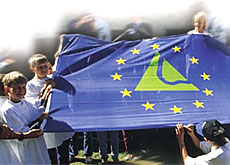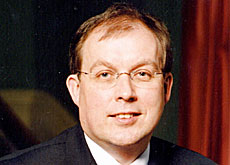Regions’ funding threatened by EU enlargement

Development subsidies given to regions around Switzerland are coming under pressure as the European Union seeks to divert funds to its new member states.
Switzerland’s border cantons fear that the squeeze on their neighbours will weaken ties that have been built up over years.
Although not an EU member, Switzerland contributes to the Union’s regional funds. Border cantons say the cooperation has helped cement ties with their neighbours and, by extension, improved relations between Switzerland and the EU.
The issue of border funding is due to be thrashed out in mid-September, when ministers meet to discuss the Union’s finances for the next few years.
The European Commissioner in charge of regional policy, Hungary’s Peter Balazs, has made it clear that priority should be given to boosting living standards in the new member countries, which joined on May 1.
The European Commission says €336 billion (SFr563 billion) has been earmarked for poorer regions during the period 2007-2113. The lion’s share will go to areas where gross domestic product is less than 75 per cent of the EU average.
Low priority
Balazs has said the Swiss border regions are not a priority and that others are in greater need.
Germany – the largest contributor to the EU’s budget – maintains that it wants regional subsidies diverted eastwards, and is likely to push the issue hard at the meeting in September.
Peter Straub, head of the Committee of the Regions, an advisory assembly that represents the regions in the EU, says he supports funding for the new members provided the process is properly managed.
“I am convinced that we should show solidarity with the eastern European countries,” he said.
“But this shouldn’t mean that we abandon current projects. Especially as the new member countries will not be able to use in a judicious manner all the funds in question,” he added.
Although not an EU member, Switzerland has taken part in regional associations with its neighbours since the 1960s.
It is a member of the Lake Geneva Council, a Franco-Swiss association, and the Lake Constance Conference which includes German and Austrian regions.
Regional ties
Interest in regional cooperation increased after the Swiss rejected membership of the European Economic Area in 1992. Shortly afterwards, these projects were made part of Switzerland’s integration policy and given financial support.
Straub, who is also the head of the parliament of the German state of Baden-Württemberg, says the resulting cross-border cooperation with Switzerland has benefited both sides.
He lives in Waldshut, a town not far from the border with Switzerland.
“We collaborate very well at town level and at the level between [German] state districts and the Swiss cantons,” said Straub. “And even if there are problems at a higher level [- relations between Bern and Brussels -] there haven’t been any repercussions on this [type of] cooperation.”
The Swiss government grants funding under the European community regional initiative, Interreg, and a SFr39 million credit line has already been earmarked for Interreg III, which runs from 2000 to 2006.
“We don’t know if these assistance programmes will keep running,” said Rudolf Schiess, head of regional policy at the State Secretariat for Economic Affairs (Seco).
Schiess added that he expected “a decrease rather than an increase” in European aid for frontier regions.
Benefits of cooperation
In the Basel area, international cooperation has been on the cards for many years, boosted by the city’s role as an economic motor for neighbouring areas in France and Germany.
“We have been participating in the Interreg programme for more than ten years,” said Eric Jakob, who oversees Basel’s cooperation efforts. “This has been an integral part of our intensive cross-border policy.”
Jakob said it would be a pity to give up on the cooperation programmes, but adds that he has received reassurances from Bern that support would be forthcoming to ensure their survival.
But according to Norbert Zufferey of the Lake Geneva Council, it is not just money that is at stake.
“We risk any gains we have made towards Switzerland’s integration in the EU,” he told swissinfo. “Losing that would be a disappointment for us.”
swissinfo
On May 1, Cyprus, the Czech Republic, Estonia, Hungary, Latvia, Lithuania, Malta, Poland, Slovakia and Slovenia joined the EU.
The number of EU members jumped from 15 to 25 and the EU’s population increased to 450 million.
The average gross domestic product per head in the new member states is 40% of the previous EU average.

In compliance with the JTI standards
More: SWI swissinfo.ch certified by the Journalism Trust Initiative


You can find an overview of ongoing debates with our journalists here. Please join us!
If you want to start a conversation about a topic raised in this article or want to report factual errors, email us at english@swissinfo.ch.